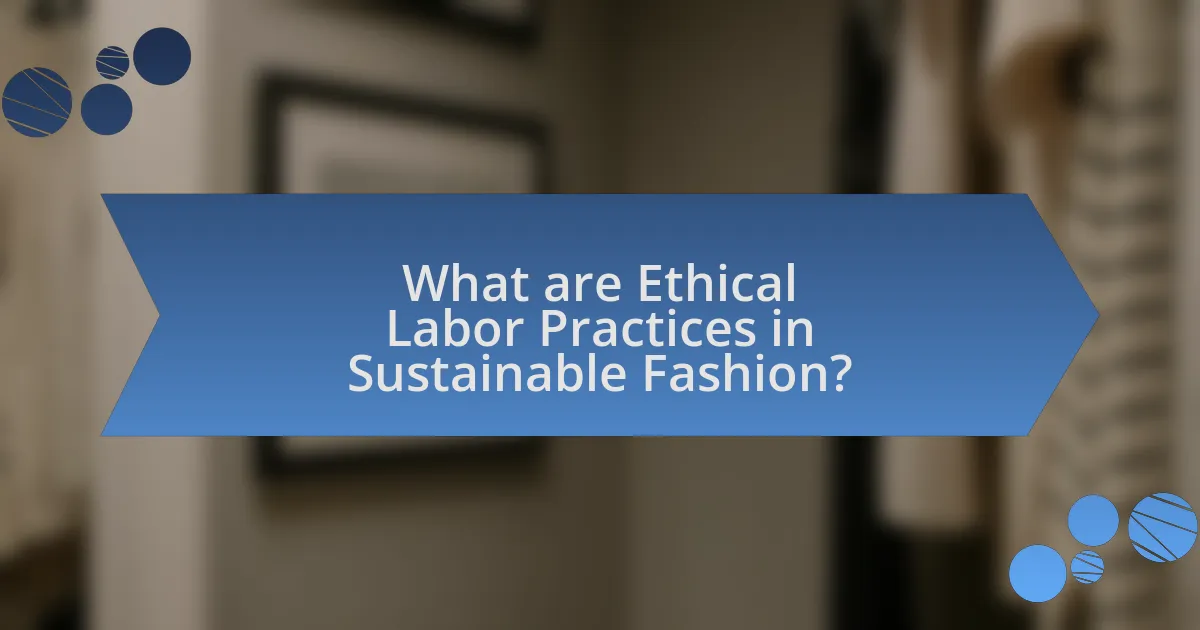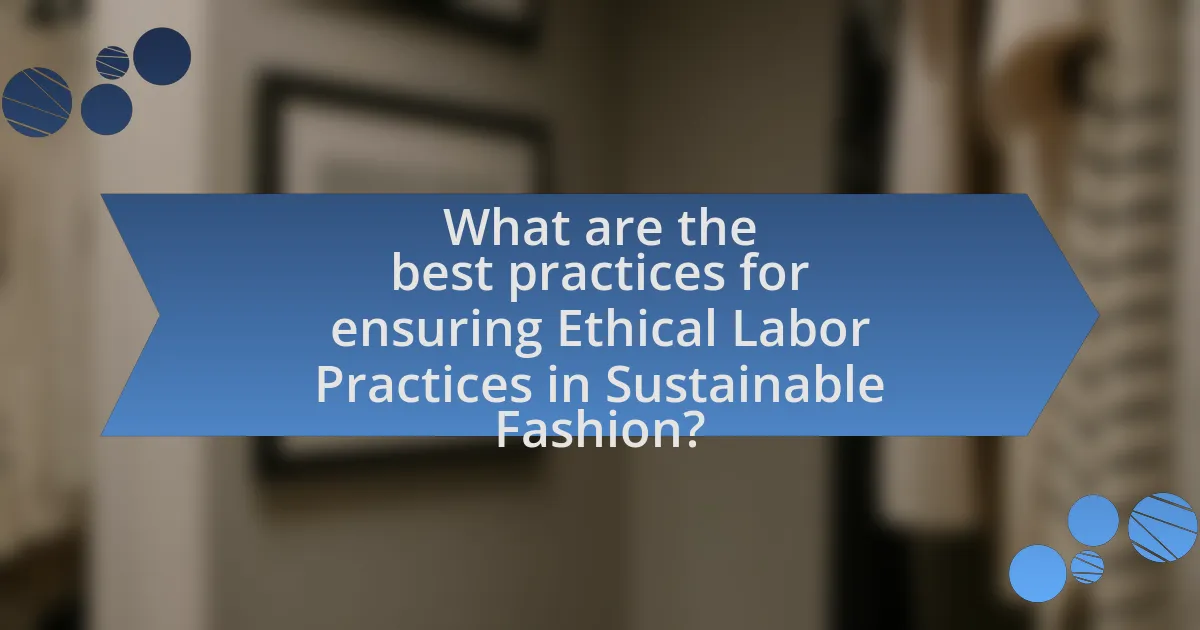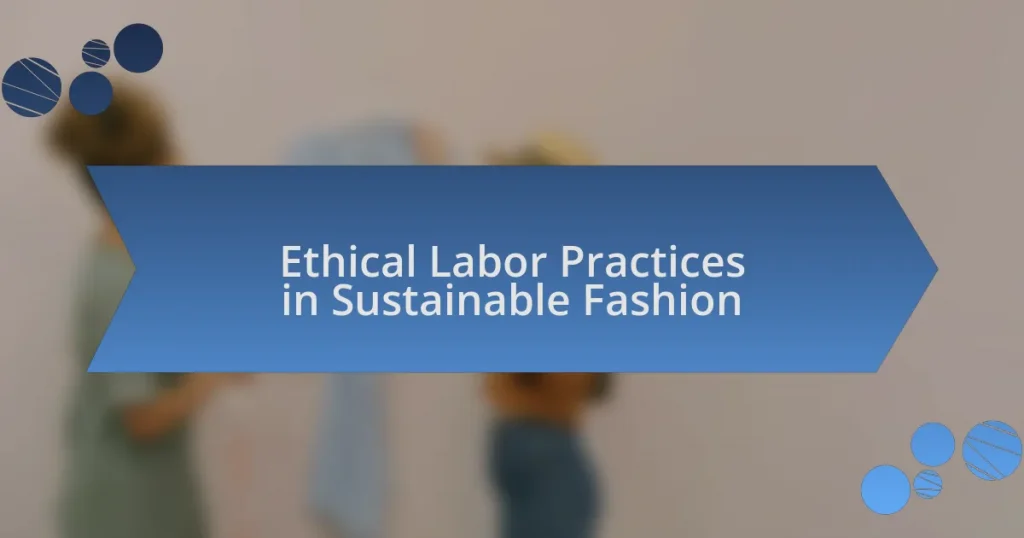Ethical labor practices in sustainable fashion encompass principles that ensure fair treatment, safe working conditions, and equitable wages for workers in the fashion industry. This article outlines the importance of these practices in combating exploitation and human rights abuses, highlighting key principles such as fair wages, the right to organize, and the prohibition of child and forced labor. It also discusses the impact of ethical labor practices on workers’ rights, sustainability, and brand reputation, while addressing the challenges brands face in implementation. Furthermore, the article explores best practices, certifications, and the role of consumer demand in shaping labor practices, emphasizing the need for transparency and collaboration to enhance ethical standards in the fashion industry.

What are Ethical Labor Practices in Sustainable Fashion?
Ethical labor practices in sustainable fashion refer to the principles and actions that ensure fair treatment, safe working conditions, and equitable wages for workers in the fashion industry. These practices include adhering to labor laws, providing a living wage, ensuring safe and healthy working environments, and prohibiting child labor and forced labor. For instance, the International Labour Organization (ILO) sets standards that promote decent work conditions, which many sustainable fashion brands strive to meet. Additionally, brands often engage in transparent supply chain practices, allowing consumers to trace the origins of their garments and verify the ethical treatment of workers.
Why are Ethical Labor Practices important in the fashion industry?
Ethical labor practices are important in the fashion industry because they ensure fair treatment, safe working conditions, and adequate compensation for workers. These practices help to combat exploitation and human rights abuses, which are prevalent in many garment-producing countries. For instance, the International Labour Organization reports that over 170 million children are engaged in child labor, often in hazardous conditions, highlighting the urgent need for ethical standards. By adopting ethical labor practices, brands can enhance their reputation, foster consumer trust, and contribute to sustainable development, ultimately leading to a more equitable industry.
What are the key principles of Ethical Labor Practices?
The key principles of Ethical Labor Practices include fair wages, safe working conditions, the right to organize, non-discrimination, and the prohibition of child and forced labor. Fair wages ensure that workers receive compensation that meets their basic needs and reflects their contributions. Safe working conditions protect employees from hazards and promote their well-being. The right to organize allows workers to form unions and advocate for their rights collectively. Non-discrimination ensures equal treatment regardless of gender, race, or other characteristics. Lastly, the prohibition of child and forced labor is essential to uphold human rights and dignity in the workplace. These principles are supported by international labor standards set by organizations such as the International Labour Organization (ILO), which provides guidelines to promote ethical practices globally.
How do Ethical Labor Practices impact workers’ rights?
Ethical labor practices significantly enhance workers’ rights by ensuring fair wages, safe working conditions, and the right to organize. These practices promote respect for labor laws and international standards, which protect workers from exploitation and discrimination. For instance, companies that adopt ethical labor practices often comply with the International Labour Organization’s conventions, which advocate for decent work and fundamental rights at work. This compliance leads to improved job security and better overall treatment of workers, as evidenced by studies showing that ethical brands report higher employee satisfaction and lower turnover rates.
How do Ethical Labor Practices contribute to sustainability?
Ethical labor practices contribute to sustainability by ensuring fair wages, safe working conditions, and respect for workers’ rights, which fosters a more responsible and equitable production system. When companies prioritize ethical labor, they reduce exploitation and promote social equity, leading to a more sustainable supply chain. For instance, a study by the Ethical Trading Initiative found that companies implementing ethical labor practices saw a 20% increase in employee productivity and a significant reduction in turnover rates, which ultimately benefits the environment by minimizing waste and resource consumption associated with high employee turnover.
What is the relationship between labor practices and environmental sustainability?
Labor practices significantly impact environmental sustainability, as ethical labor practices often promote environmentally friendly methods and materials. When companies prioritize fair labor conditions, they are more likely to adopt sustainable practices, such as reducing waste, using eco-friendly materials, and minimizing carbon footprints. For instance, a study by the International Labour Organization found that businesses committed to ethical labor standards tend to implement better environmental management systems, leading to reduced environmental degradation. Thus, the relationship between labor practices and environmental sustainability is interconnected, where improved labor conditions can drive more sustainable environmental outcomes.
How can Ethical Labor Practices enhance brand reputation?
Ethical labor practices enhance brand reputation by fostering consumer trust and loyalty. When brands prioritize fair wages, safe working conditions, and respect for workers’ rights, they demonstrate a commitment to social responsibility. This commitment can lead to increased customer satisfaction, as studies show that 66% of consumers are willing to pay more for products from socially responsible companies. Furthermore, brands that engage in ethical labor practices often experience positive media coverage and word-of-mouth referrals, which can significantly boost their public image. For instance, companies like Patagonia and Everlane have built strong reputations by transparently sharing their labor practices, resulting in a loyal customer base and increased sales.

What are the challenges in implementing Ethical Labor Practices?
Implementing ethical labor practices faces several challenges, including lack of transparency in supply chains, resistance from stakeholders, and varying legal standards across countries. Transparency issues arise when companies cannot trace the origins of their materials or the conditions under which their products are made, making it difficult to ensure ethical standards are met. Resistance from stakeholders, such as investors or consumers, can occur when ethical practices are perceived as increasing costs or reducing competitiveness. Additionally, differing legal frameworks and labor regulations across countries complicate the enforcement of ethical labor practices, as companies may exploit these discrepancies to minimize compliance. These challenges hinder the widespread adoption of ethical labor practices in the sustainable fashion industry.
What obstacles do brands face in adopting Ethical Labor Practices?
Brands face significant obstacles in adopting Ethical Labor Practices, primarily due to cost implications, supply chain complexity, and lack of transparency. The financial burden of implementing fair wages, safe working conditions, and compliance with ethical standards can deter brands, especially smaller ones, from making necessary changes. Additionally, the intricate nature of global supply chains often obscures labor practices, making it challenging for brands to monitor and enforce ethical standards effectively. According to a 2021 report by the Ethical Trading Initiative, 60% of brands struggle with visibility in their supply chains, which complicates efforts to ensure ethical labor practices are upheld.
How do supply chain complexities affect labor practices?
Supply chain complexities significantly impact labor practices by creating challenges in transparency, accountability, and working conditions. These complexities often arise from multi-tiered supply chains, where brands may lack visibility into the labor practices of their suppliers. For instance, a study by the Ethical Trading Initiative found that 60% of companies do not know the full extent of their supply chains, leading to potential exploitation of workers in lower tiers. Additionally, increased pressure for cost reduction and rapid production timelines can result in poor labor conditions, such as excessive working hours and inadequate safety measures. This correlation between supply chain intricacies and labor practices underscores the need for brands to implement robust monitoring systems to ensure ethical standards are upheld throughout their supply chains.
What role does consumer demand play in shaping labor practices?
Consumer demand significantly influences labor practices by driving companies to adopt ethical standards to meet consumer expectations. As consumers increasingly prioritize sustainability and ethical production, brands are compelled to ensure fair labor conditions, transparency, and responsible sourcing in their supply chains. For instance, a 2021 survey by McKinsey found that 67% of consumers consider sustainability when making purchasing decisions, prompting brands to implement better labor practices to attract and retain customers. This shift in consumer behavior directly impacts how companies structure their labor policies, leading to improved working conditions and fair wages in the fashion industry.
How can brands overcome these challenges?
Brands can overcome challenges in ethical labor practices by implementing transparent supply chain management. This involves actively monitoring and auditing suppliers to ensure compliance with labor standards, which can be supported by third-party certifications like Fair Trade or the Ethical Trading Initiative. Research indicates that brands adopting transparency report a 20% increase in consumer trust, as consumers are increasingly prioritizing ethical considerations in their purchasing decisions. By fostering direct relationships with workers and investing in fair wages and safe working conditions, brands can not only enhance their reputation but also contribute to sustainable development in the fashion industry.
What strategies can be employed to improve labor conditions?
To improve labor conditions in the sustainable fashion industry, companies can implement fair wage policies, enhance workplace safety standards, and promote transparent supply chains. Fair wage policies ensure that workers receive compensation that meets or exceeds living wage benchmarks, which is crucial for their well-being. For instance, the Ethical Trading Initiative reports that fair wages can significantly reduce poverty levels among garment workers. Enhancing workplace safety standards involves regular training and compliance with health regulations, which can decrease workplace accidents and improve overall worker morale. The International Labour Organization emphasizes that safer working environments lead to higher productivity and lower turnover rates. Promoting transparent supply chains allows consumers to make informed choices and encourages brands to uphold ethical practices, as highlighted by the Fashion Transparency Index, which shows that brands with transparent practices tend to have better labor conditions.
How can collaboration with NGOs and stakeholders enhance Ethical Labor Practices?
Collaboration with NGOs and stakeholders enhances ethical labor practices by providing expertise, resources, and accountability mechanisms that promote fair treatment of workers. NGOs often have extensive knowledge of labor rights and can offer training programs to companies, ensuring compliance with ethical standards. For instance, partnerships with organizations like Fair Trade International have led to improved working conditions and fair wages in the fashion industry. Additionally, stakeholders, including consumers and investors, can exert pressure on companies to adopt ethical practices, as seen in the rise of ethical consumerism, where 66% of global consumers are willing to pay more for sustainable brands. This collective effort fosters transparency and encourages companies to prioritize ethical labor practices, ultimately leading to a more responsible and sustainable fashion industry.

What are the best practices for ensuring Ethical Labor Practices in Sustainable Fashion?
The best practices for ensuring ethical labor practices in sustainable fashion include implementing fair wages, ensuring safe working conditions, and promoting transparency in supply chains. Fair wages are essential, as they allow workers to meet their basic needs; for instance, the Fair Trade movement has established minimum wage standards that help protect workers in developing countries. Safe working conditions are critical, as evidenced by the International Labour Organization’s reports highlighting the dangers faced by garment workers; brands must conduct regular safety audits to ensure compliance. Transparency in supply chains is vital, as it allows consumers to make informed choices; brands that disclose their suppliers and production processes foster accountability and ethical practices. These practices collectively contribute to a more sustainable and ethical fashion industry.
What certifications and standards exist for Ethical Labor Practices?
Certifications and standards for Ethical Labor Practices include Fair Trade, Global Organic Textile Standard (GOTS), and the Ethical Trading Initiative (ETI). Fair Trade certification ensures that producers receive fair wages and work under safe conditions, promoting sustainable livelihoods. GOTS sets stringent environmental and social criteria for organic textiles, ensuring fair labor practices throughout the supply chain. The ETI provides a framework for companies to improve working conditions and uphold workers’ rights, emphasizing compliance with international labor standards. These certifications collectively promote ethical labor practices in the fashion industry, ensuring accountability and transparency.
How do certifications like Fair Trade and GOTS influence labor practices?
Certifications like Fair Trade and GOTS significantly influence labor practices by establishing standards that promote fair wages, safe working conditions, and workers’ rights. Fair Trade certification mandates that producers receive a minimum price for their goods, which helps ensure that workers are compensated fairly and can support their families. GOTS, or the Global Organic Textile Standard, requires compliance with strict social criteria, including the prohibition of child labor and the right to organize, thereby fostering a safer and more equitable work environment. These certifications are backed by rigorous auditing processes that verify compliance, ensuring that brands adhere to ethical labor practices and contribute to sustainable development in the fashion industry.
What are the benefits of adhering to these standards?
Adhering to ethical labor standards in sustainable fashion enhances brand reputation and consumer trust. Companies that implement these standards demonstrate a commitment to fair labor practices, which can lead to increased customer loyalty and sales. For instance, a 2021 survey by Nielsen found that 66% of global consumers are willing to pay more for sustainable brands, indicating a direct correlation between ethical practices and consumer purchasing behavior. Furthermore, adherence to these standards can reduce legal risks and improve employee satisfaction, leading to lower turnover rates and higher productivity. A study published in the Journal of Business Ethics highlighted that organizations with strong ethical labor practices experience better employee engagement and retention, ultimately contributing to long-term business success.
What role does transparency play in Ethical Labor Practices?
Transparency is crucial in ethical labor practices as it fosters accountability and trust between companies and stakeholders. By openly sharing information about labor conditions, supply chains, and sourcing practices, companies can demonstrate their commitment to ethical standards. For instance, a 2020 report by the Ethical Trading Initiative found that brands that disclose their supply chain information are more likely to improve labor conditions and reduce exploitation. This transparency not only enhances consumer confidence but also encourages better practices across the industry, as companies are held accountable for their labor practices through public scrutiny.
How can brands effectively communicate their labor practices to consumers?
Brands can effectively communicate their labor practices to consumers by utilizing transparency, storytelling, and third-party certifications. Transparency involves openly sharing information about labor conditions, wages, and sourcing practices, which builds trust with consumers. For instance, brands like Patagonia provide detailed reports on their supply chain and labor practices, allowing consumers to understand their ethical commitments. Storytelling can engage consumers emotionally by highlighting individual worker experiences and the positive impact of ethical practices, as seen in campaigns by brands like Everlane. Additionally, third-party certifications, such as Fair Trade or Global Organic Textile Standard, lend credibility to claims and assure consumers of adherence to ethical labor standards. These strategies collectively enhance consumer awareness and foster loyalty towards brands committed to ethical labor practices.
What tools can be used to enhance transparency in the supply chain?
Blockchain technology can be used to enhance transparency in the supply chain by providing a decentralized and immutable ledger for tracking products from origin to consumer. This technology allows all stakeholders, including manufacturers, suppliers, and consumers, to access real-time data about the product’s journey, ensuring accountability and traceability. For instance, companies like Everledger utilize blockchain to track the provenance of diamonds, demonstrating how this tool can effectively verify ethical sourcing. Additionally, supply chain management software, such as SAP Ariba, offers visibility into supplier practices and compliance, further promoting transparency. These tools collectively contribute to ethical labor practices by enabling informed decision-making and fostering trust among consumers.
What practical steps can consumers take to support Ethical Labor Practices?
Consumers can support Ethical Labor Practices by choosing to purchase from brands that are transparent about their supply chains and labor conditions. By researching and selecting companies that adhere to fair labor standards, consumers can ensure their purchases contribute to ethical practices. For instance, brands that are certified by organizations like Fair Trade or those that provide detailed information about their labor practices demonstrate a commitment to ethical labor. Additionally, consumers can advocate for better labor practices by participating in campaigns that promote workers’ rights and by supporting local artisans and businesses that prioritize fair wages and safe working conditions.















